Nevertheless, I prefer the mystique of the eras that I never truly got to see except on documentaries and the images that I see in my head while I daydream about what it must have been like back in the day. That said, I don't imagine life before baseball gloves and catcher's masks, but yeah... tobacco card era baseball and beyond (up until the players that began their careers in the late 70s / early 80s); those were the days.
 A prime example of what they don't have any more in baseball is a Joe Dimaggio. We could ask where he's gone, but like Paul Simon (who Dimaggio initially wasn't impressed by due to an incorrect perception that "Mrs. Robinson" was an insult), we have no clue. In 1999, he shuffled off this mortal coil and left many fans sad and lost with only their memories to share. Fortunately, there's HBO's Where Have You Gone, Joe Dimaggio to help us remember the Yankee Clipper / #5 / Mr. Coffee as something more than a couple of pages in a best players ever baseball book.
A prime example of what they don't have any more in baseball is a Joe Dimaggio. We could ask where he's gone, but like Paul Simon (who Dimaggio initially wasn't impressed by due to an incorrect perception that "Mrs. Robinson" was an insult), we have no clue. In 1999, he shuffled off this mortal coil and left many fans sad and lost with only their memories to share. Fortunately, there's HBO's Where Have You Gone, Joe Dimaggio to help us remember the Yankee Clipper / #5 / Mr. Coffee as something more than a couple of pages in a best players ever baseball book.I don't know if it's safe to say that he's that much better than what an Albert Pujols type player is, but there was something about him... a war era player that lost the best years of his career (43-45, 2 years after the 56-game hitting streak - 1 more would have got him some Heinz 57 money) to World War 2.
He lost Marilyn Monroe to the American people and a drug overdose (not to mention the Kennedys), but he kept a vigil to her for the rest of his life with the red rose he placed by her gravesite.
In 13 seasons, he batted .325 with 369 strikeouts TOTAL! In comparison, that's about 2 years of Mark Reynolds' career (not even). To top it off, he hit 361 home runs for his career.
He was so popular in New York, he could make Mickey Mantle feel like a schlub for daring to replace him.
When it came time to go, he didn't seem to know despite the fact that Casey Stengel was trying to make it easy on him. In the end, Life Magainze, Andy High, and Gene Woodling combined to show just how pedestrian that the "Greatest Living Player" had become. Like Lou Gehrig before him, a superstar being shown as being mortal knew that something was wrong. Where Lou Gehrig's finale came with being congratulated for doing the routine, Dimaggio was taken down to size for not being able to run, field, or hit in the way that he did when he electrified the 1941 spring and early summer.
For even with a bat stolen, he didn't complain. Sure, he wanted to bang heads to get it back, but he went right on hitting until it came back.
He tried his hand at TV, but he quit when he wasn't successful. As Ric Flair said, "to be the best, you have to beat the best," and to Joltin' Joe, if he couldn't be the best, he didn't want to play, so he did what he was good at - running restaurants, making appearances, signing bats, and adding his name to a children's hospital.
Sadly, the band who became a Les Brown record will never be seen at a Dinky Donuts again, but he will always be an example of what's right with baseball and the world.



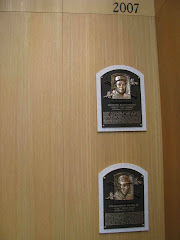


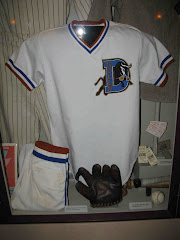


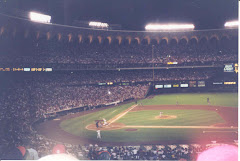
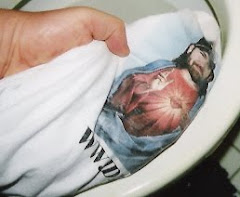


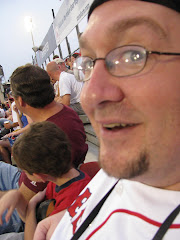
No comments:
Post a Comment